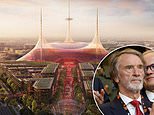The club is facing renewed fan protests following the revelation of a controversial new scheme that could drastically alter how long-standing supporters access season tickets. This contentious proposal, known as the Personal Seat Licence (PSL), has ignited a firestorm of criticism and resentment within the devoted fanbase, threatening to deepen the existing chasm between the club’s ownership and its loyal following.
Under this proposed system, supporters would be required to pay a hefty fee, potentially up to £4,000, merely for the right to purchase a season ticket. Crucially, this significant outlay does not even guarantee a seat, representing a substantial financial burden that many feel is exploitative and exclusionary. The concept is common in American sports but is an unprecedented and unwelcome prospect for English football news.
Supporters’ collective “The 1958,” a prominent voice against the club’s current custodians, has vehemently condemned the PSL. They argue that its introduction would “force out supporters who have followed the club for decades,” effectively pricing out younger generations, local communities, and the bedrock of United’s faithful following. This group views it as another step towards the “Americanisation of our game,” fundamentally eroding football’s working-class roots.
While Manchester United asserts that the PSL scheme has only been explored hypothetically in discussions regarding a new stadium, the very notion has amplified existing anger. This comes on the heels of numerous fan protests last season, particularly a large demonstration in March after Sir Jim Ratcliffe’s Ineos group acquired a significant stake. These protests also targeted rising ticket prices and designs for the proposed new stadium.
The group strongly believes the club’s consultation with US-based CSL International on the PSL issue demonstrates how “out of touch our club and owners have become.” They express deep distrust in the club’s assurances, viewing United’s actions as a bellwether for other clubs and pledging to campaign vigorously against the scheme. This sentiment underscores the ongoing tension surrounding the club’s direction and ownership under the Glazer Family and Ineos.
The backlash against the PSL highlights a recurring theme of friction between the commercial interests of modern football and the traditions held dear by fans. For Manchester United, a club built on community and working-class support, alienating a significant portion of its fanbase with such schemes could have long-term repercussions on atmosphere, attendance, and overall brand loyalty, despite the club’s global appeal.
If United proceeds with such a contentious model, it could set a precedent for other Premier League clubs, further commercializing access to live football and potentially marginalizing fans based on their economic means. The unfolding saga at Old Trafford serves as a critical test case for fan power against commercial pressures in elite football.
The situation remains highly volatile, with both the club and its supporters entrenched in their positions. The 1958’s commitment to persistent fan protests signals a drawn-out battle ahead. The outcome of this dispute over the Personal Seat Licence will undoubtedly shape the relationship between Manchester United’s management and its passionate supporters for years to come, offering a significant narrative in the ongoing discussion about modern football’s soul.






Leave a Reply